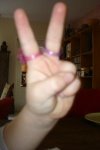 So here's technology again.... WEB 2.0. I have to admit I was ignorant about the term till last thursday. Even though I had come across the term I had happily skipped it; thinking that it was another software application... (to cope with information overload I'm applying optimal ignorance all the time). Till thursday when John Barben did a great tooltour for the foundations of communities of practice workshop in which I'm a mentor this time. He explained the difference between web 1.0 and web 2.0. You can find it explained by Tim O'Reilly in an article here. Tim O'Reilly and Dale Dougherty seem to have coined the term to indicate the shift in applications on the web since the dotcom collapse.
So here's technology again.... WEB 2.0. I have to admit I was ignorant about the term till last thursday. Even though I had come across the term I had happily skipped it; thinking that it was another software application... (to cope with information overload I'm applying optimal ignorance all the time). Till thursday when John Barben did a great tooltour for the foundations of communities of practice workshop in which I'm a mentor this time. He explained the difference between web 1.0 and web 2.0. You can find it explained by Tim O'Reilly in an article here. Tim O'Reilly and Dale Dougherty seem to have coined the term to indicate the shift in applications on the web since the dotcom collapse.The shift he talks about is from the web as a platform for information updates and scheduled software releases on the basis of proprietary control towards the web as an 'architecture of participation', with services acting as brokers connecting the edges of the web and harnessing the power of the users themselves. These applications get better the more people use it (eg. the more people use skype, the easier it gets to phone all your friends with skype and forget about the phone). Web 2.0 giants have used the power of the web to harness collective intelligence by the use of hyperlinking, associations becoming stronger with repetition or intensity. Examples of innovations are the peer (and free) productions of wikipedia, flickr and open source software. And of course blogging as creating dynamic content versus the more static webpages. Uhm, so much more to explore... The mindset behind it seems to be one of sharing ideas and experiences freely in public, with a different definition of trust. John Barben has a blog as well.
Why I was struck by web 2.0 is because I can see the potential of web 2.0 applications for development. Harnessing collective intelligence by linking southern views. And the opportunity for northerners to listen to southern views and vice versa (though I realize the opportunity to listen does not mean that people will be interested in listening, they need a rationale first) . For instance, southern bloggers (think of eg. NGO leaders) could help partners organisations in the North to understand their realities. But blogging needs time, ease of writing and a certain mindset of freely sharing thoughts. So blogging may seem a luxuory to southern NGO leaders (and for a blogging community to emerge, bloggers need to read each other's blogs as well, which makes it even more time consuming). Maybe I'll try and trace more about the number of southern bloggers.
By the way, Beth's suggestion on my previous post to introduce the sentence 'my mom is a blogger' into Dutch school books reminded me of the school's project on mail, where they invited a postman and walked all children to the postbox to send a letter to their grandparents or friends. My suggestion to link the theme mail to email as well was well appreciated :-). So I'm not sure my daughter's teachers would even know what a blog is (and neither did I till last February... ).

2 comments:
I'm a little leery of Web 2.0. This idea that 1.0 was all about information updates and now 2.0 as the architecture of participation is overblown. The web has been an architecture for participation from day 1. What is new is people have new products to sell so they need a new banner to wave to sell them. Yes, things have evolved. But look at the amazing leap in distance communication that emerged right from the start of the Internet and later the web. People connecting with people over time and space. Communities of thought and interest emerging from discussion boards.
Yes, there are now blogs and wikis. Yes there are cool apps that connect between these tools. But at the essense is still the human desire to connect which ISN'T new!
Phew. Had to get that off my chest. I keep feeling like each wave of folks who either comes to the web or designs new tools thinks they invented it. It is an ever evolving invention, collectively, both with its past, present and future.
Rant over!
Hi Nancy, I'm happy with a critical view! Because it's a new area for me. Still the idea of web 2.0 being different clicks with my own experiences. (maybe I moved from web 1.0 thinking to web 2.o thinking and you were always web 2.0 :)). Could it be that you were far ahead of everybody?? I mean, I kind of 'discovered' learning and connecting through the web recently and it is like a new way of thinking that this is possible and that it produces useful learning. But I think you have a point in the sense that the human element is behind it. The mindset of web 2.0 designers could be analysed as different from the web 1.0 assumptions? I have to read and experience a lot more to really have an opinion on this.
Post a Comment